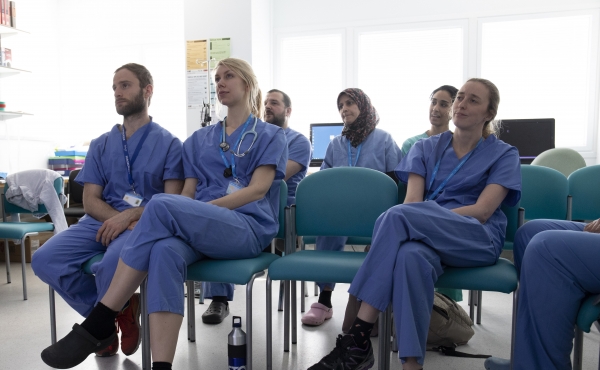Subspecialty Modules
Trainees may wish to train in more specialised areas of Stage 3 Special Interest Area (SIA) Pain
Further details of specialist areas in pain medicine are detailed on this page. The FPM is aware that some trainees are having difficulty in accessing some of these more specialised areas. We have therefore compiled a list of regions where these subspecialty modules are available. We would encourage trainees to pro-actively seek out these opportunities.
Specialist areas in Pain Medicine
If you are interested in clinical or bioscience research and how this can translate in to new therapies and understanding of pain, then Academic Pain Medicine may be suitable for you.
Pain Medicine as a medical specialty is in its infancy. The complex and multifactorial nature of pain perception provides the opportunity for a wide field of research including, but not exclusively the pathophysiology of pain; cognitive processes in pain; pain genomics; pain imaging; diagnostic tools; therapeutic approaches; pharmacotherapy; immunomodulation; interventional therapy and devices; and the biopsychosocial impact of pain. There continues to be a gap between pain research and clinical pain management with a significant role for translational pain research.
Formal academic training can be integrated into training programmes. In England, the National Institute for Health Research (NIHR) provide a research career pathway for clinicians through the NIHR Integrated Academic Training (IAT) programme for Doctors and Dentists, funding an academic training scheme for trainee doctors that span the whole of their training. For Scotland, the Scottish Clinical Research Excellence Development Scheme (SCREDS) provides a similar integrated training pathway enabling training for academic clinicians. In Northern Ireland, research training will be part of the Health Research Board Irish Clinical Academic Training (ICAT) Programme, an all-Ireland national programme for clinician scientists based at six major Irish universities and their affiliated hospital groups. In Wales, this is through the Wales Clinical Academic Track (WCAT) fellowship programme. Formal academic research training can also be through University higher degree courses such as a MD and PhD. Exposure to research experience can be gained through local institutional or regional research fellowships, and trainee network projects.
The prevalence of pain within a hospital’s patient population is high at any given time. Pain Medicine doctors have and important role within the inpatient pain team working closely with highly specialised nurses to support clinical staff caring for surgical and medical patients requiring specialist pain advice and interventions. The development of new techniques and enhanced recovery pathways provides the opportunity to improve patients’ experience of pain through their perioperative journey with an increased focus on early intervention and the prevention of chronic pain.
Doctors working within this field have regular clinical sessions for inpatient ward rounds to support patients following elective and emergency surgery. The role in some centres has expanded to support all patients in hospital struggling with pain from acute, acute on chronic, chronic and cancer pain. This leads to collaborative working with a large number of doctors and allied health professionals from medical and surgical specialties within acute hospitals in a variety of clinical situations.
An inpatient pain team may include doctors (Pain Medicine doctor or Anaesthetist), specialist nurses, physiotherapists, and psychologists.
Cancer pain is common, often under-reported and under-treated for a variety of complex reasons which can be influenced by patients, families and healthcare professionals’ beliefs. The pathophysiology of cancer pain can make the effective management challenging.
Pain Medicine doctors within this field work closely with primary care, palliative care, oncology, other hospital specialties, and as part of a multidisciplinary team for effective pain management for people with cancer. They play a key role in coordinating pain management care across multiple specialties for these patients. Pain Medicine doctors may also provide invasive procedures after careful assessment taking into account the disease process, prognosis, patient and family expectation and appropriate timing to ensure that these procedures can contribute to enhanced pain relief, reduction of medication use and improved quality of life. The management of cancer pain is not only pain towards the end of life, but also at diagnosis, as consequence to therapies and persistent pain in cancer survivors. The work in this field can be in a range of settings including hospices, hospitals and the community.
Severe, persistent and unrelieved pain is recognised as one of the world’s major healthcare needs and in the UK chronic pain affects up to one third of the population. Pain Medicine doctors work with adults, with a wide range of chronic pain disorders within a multidisciplinary and often multispecialty approach to managing pain. The Pain Medicine multidisciplinary team can include doctors, nurses, psychologists, physiotherapists, pharmacists and occupational therapists using their knowledge and skills to best address the biopsychosocial impact on a person with a painful condition. Pain Medicine doctor work as an integral member of this specialist team co-ordinating the pain management care.
This work involves close working relationship with primary care, community services and other specialities to support people with chronic pain co-morbidities often in an outpatient setting. Pain Medicine doctors also provide a breadth of interventions for pain management in day-surgery theatre facilities.
Community pain management services can vary in what they offer from full multi-professional diagnostic and treatment options, including pain management programmes and minor interventions to the delivery of rehabilitative strategies only with appropriate links and support from specialists.
Pain Medicine doctors working within multidisciplinary community services will have the opportunity to work with other sectors of healthcare, collaborating with primary care networks, secondary care, social care and the voluntary sector. This includes work within communities that can promote health and wellbeing.
Pain Medicine doctors who work in this field will usually work across secondary care also, providing variety to the working week.
Most doctors in Pain Medicine practice interventional pain management to varying degrees of complexity. Interventional pain management procedures are minimally invasive techniques which can be specifically designed to diagnose and treat a wide array of painful conditions. They are usually performed as part of the multidisciplinary approach to improve a patient's overall quality of life.
Doctors working in this field required an in depth knowledge and pathophysiology of the condition being treated. The Pain Medicine doctor leads a theatre team to perform interventional procedures using a variety of imaging techniques including ultrasound and fluoroscopy. The advances in technology have opened doors to new treatments. Neuromodulation involves the use of technology to alter or modulate nerve activity by delivering electrical or pharmaceutical agents directly to a target area.
The prevalence of chronic pain in children is reported between 6-25 %. The management of pain in childhood critically depends on a thorough understanding of the developmental and environmental factors that influence nociceptive processing, pain perception and the response to treatment during maturation from infancy to adolescence. Most children and young adults with persistent pain are managed effectively in primary and secondary care services; some require support from specialist services in tertiary centres. Training for paediatric pain medicine requires experience in adult and paediatric pain medicine.
Pain Medicine doctors in this field are often also trained in paediatric anaesthesia. For some, practices can include adult and paediatric Pain Medicine. The multidisciplinary work requires collaborative working with other medical specialties to support children and young people with a variety of acute and chronic pain conditions in inpatient and outpatient settings.
Further information on paediatric pain please see our paediatric pain training and retraining page.
Pain Medicine rehabilitation and pain management programmes incorporates behavioural, physical and occupational therapies to help people with chronic pain reduce its daily impact, restore physical activities, and improve quality of life. Pain management programmes can provide more in-depth psychological approaches for complex pain conditions and also help participants reduce the reliance on the use of other medications that can impact health and quality of life in the long term.
The Pain Medicine doctor works with a multidisciplinary team including, physiotherapists, psychologists, pharmacists, nurse specialists and occupation al therapy delivering one to one and group based work.
Both persistent pain and substance misuse are common in the general population with significant affective, cognitive, social and environmental influences presenting clinicians with significant challenges. The increased awareness of the risks of addiction with pharmacotherapies used for pain management has led to an expansion in this field.
Pain Medicine doctors play a key role working with the extended Pain Medicine multidisciplinary team, substance misuse specialists, and primary care to develop a pain management plan for people with persistent and substance misuse.
Pain can often be a significant feature of medico legal cases related to personal injury, workplace accident, road traffic accidents, or other kinds of incidents. Pain Medicine doctors can work as medical experts providing comprehensive multi-dimensional assessments, independent opinion, and reports for claimants or those defending a claim to help courts and tribunals come to a decision. Occasionally, an expert witness report is required in criminal proceedings. Additional training to become an expert witness is recommended.
Pain Medicine doctors can also specialist in disease specific conditions such as, facial pain, headaches, pelvic pain, cardiac, CRPS, visceral, and opioid pharmacotherapies.
A career as a doctor in Pain Medicine starts with a medical degree. Pain Medicine is a subspecialty of Anaesthesia. There are opportunities for exposure and training in Pain Medicine at different stages of medical training.
We encourage trainees to proactively seek out these opportunities
If you would like any more information, please contact the FPM. We can then provide you with the contact details for the relevant Regional Advisors in Pain Medicine.
|
Region |
Modules Available |
|---|---|
|
Anglia |
Cancer Pain, Paediatric Pain, Spinal Cord Stimulation, Intra-Thecal Drug Delivery |
|
North Thames |
Cancer Pain, Paediatric Pain, Spinal Cord Stimulation, Intra-Thecal Drug Delivery |
|
North of Scotland |
Spinal Cord Stimulation |
|
Northern |
Spinal Cord Stimulation, Intra-Thecal Drug Delivery |
|
Nottingham & Mid-Trent |
Cancer Pain, Spinal Cord Stimulation |
|
Oxford |
Cancer Pain, Paediatric Pain, Spinal Cord Stimulation, Intra-Thecal Drug Delivery |
|
Peninsula |
Cancer Pain, Spinal Cord Stimulation, Intra-Thecal Drug Delivery |
|
Severn |
Paediatric Pain, Spinal Cord Stimulation, Intra-Thecal Drug Delivery |
|
Sheffield & North Trent |
Paediatric Pain, Spinal Cord Stimulation |
|
South East Scotland |
Spinal Cord Stimulation, Intra-Thecal Drug Delivery |
|
Wales |
Acute Pain, Cancer Pain, Specialist Chronic Pain in Secondary & Tertiary Care, Community Pain Medicine, Rehabilitation/Pain Management Programme, Pain Medicine and Substance Misuse, Disease Specific Specialist Areas |
|
West of Scotland |
Cancer Pain, Paediatric Pain, Spinal Cord Stimulation, Intra-Thecal Drug Delivery |
|
Yorkshire |
Cancer Pain, Paediatric Pain, Spinal Cord Stimulation, Intra-Thecal Drug Delivery |
Want to know more about recruitment into Pain Medicine?
Find out more about Pain Medicine recruitment and training.



